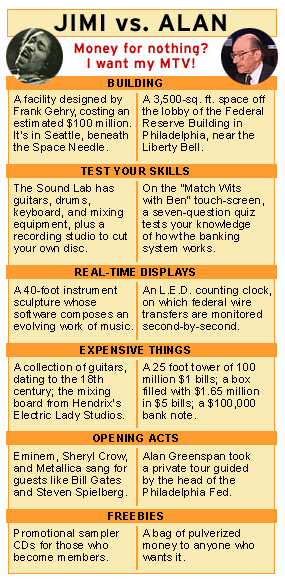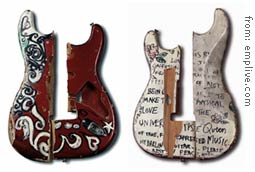SEATTLE/PHILADELPHIA (CNN/Money) -
Museums can be big business.
New York's Metropolitan Museum of Art, for example, attracts more than 5 million visitors a year, outdrawing the Yankees and Knicks combined. The Getty in Los Angeles has a $2 billion endowment.
There are more than 16,000 other museums in the land, according to the Association of American Museums. Most of them are born of humbler stock, such as the toilet seat museum in San Antonio.
To illustrate the extremes of this eclectic industry, CNN/Money investigated two museums at opposite ends of the country. One -- the Experience Music Project in Seattle -- celebrates art, but is extravagantly endowed.
The other -- the Federal Reserve's new museum in Philadelphia -- celebrates money, but is modestly funded.
Experience moola project
As a teenager, Paul Allen dreamed of becoming a guitarist like his virtuoso hero, Jimi Hendrix. But while Allen does play in his own band, his billions came from Windows, not a wah-wah pedal.
In the 1990s, the Microsoft cofounder came up with the idea of building a "museum of Jimi," which would display items from the 8,000 Hendrix-related artifacts in Allen's personal collection.

When a legal dispute with the musician's estate blocked Allen, he simply thought bigger. Result: the Experience Music Project, a multi-faceted music appreciation foundation estimated to have cost $100 million or more to launch.
Opened in 2000, EMP is a pop-culture temple, encompassing 18 rooms across 140,000 square feet of exhibition space. There are theaters, galleries, and performance space, plus more tchotkes than you can imagine.
An exhibit on the history of hip-hop boasts Afrika Bambaata's cape and hand-carved staff; the sneakers immortalized by Run-DMC in "My Adidas;" and a collection of spray-paint cans used by graffiti artists in the Bronx, where hip-hop originated.
Disco fans can look at John Travolta's white suit from Saturday Night Fever, or a massive wall of photos from Studio 54, including ones from the night Bianca Jagger rode into the club astride a magnificent white horse.
For rockers, there's much more: examinations of rock's R&B roots; paraphernalia from the Summer of Love; videos of early Nirvana performances.
You can view Jimi Hendrix's fuzzbox and guitars, as well as a touching series of letters home he wrote while in military jump school. (A broken ankle got Jimi his discharge, saving him from a probable Vietnam tour.)
 |
|
| Jimi's broken axes |
In an elaborate "do-it-yourself" space, you can play a variety of instruments, sing into microphones, and record it all for posterity. For $10, you get a CD of your performance. (With a cute, but tone-deaf, redhead as my duet partner, I passed.)
Of course, all this glitz doesn't come cheap. An adult admission to EMP costs $20, and costs ratchet up quickly. There's a lot to buy here: t-shirts, books, posters, videos, compact discs.
Too commercial, you say? Hey, that's rock-n-roll. Besides, there's an ATM in the gift shop.
Money in motion
While music-biz fanfare is the norm at EMP, the most commotion the Philadelphia Fed's new gallery may ever see probably came on July 2, when Alan Greenspan took a private tour prior to its opening.
The Fed chairman made only brief remarks and took no press questions, but cameras were out in force to capture some reaction on his famously unflappable face.
When Greenspan paused to view a display on currency circulation, the paparazzi clambered atop a glass box full of money � setting off security alarms, rousing Secret Service officers into response mode, and generally terrifying the gallery's staff.
"I've never seen anything like that before," said Albert Lee, a tour guide who was present. "Those guys were crazy."
Money in Motion is a charming tribute to the nation's banking system. It's small, but for money groupies, this is backstage at the Fillmore.
Old currency is everywhere: colonial-era coins and the first greenback dollar, which began circulating during the Civil War to foil counterfeiters. You get a look at a real $100,000 bill, which are only used (quite rarely) to make transfers between banks.
The exhibit is no moneymaker (it's free), but that doesn't mean it's not entertaining.
A video kiosk uses pop culture -- Elvis, the space program, and Michael Jordan all appear -- to explain economic history. Another display views the gold standard through a Wizard of Oz lens.
I played a touch-screen quiz game a few times (the questions change), never managing to top the board's current champion, who answered all seven questions in just 4.4 seconds.
The exhibit saves the best for last: as a parting gift, everyone is given a bag of money.
Of course, it's been shredded into confetti.

|

